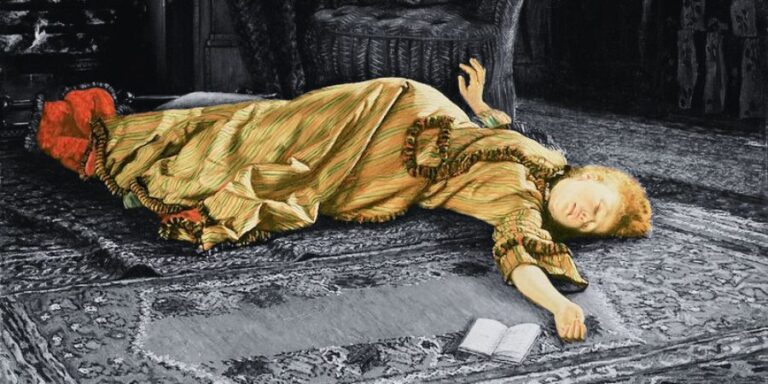My five-year-old and I were reading at bedtime recently when we reached what constituted her—and, presumably, many children’s—first literary fainting episode. It occurs after Wilbur the pig, getting loaded into a truck to head to the fair, hears what is doubtless the most terrifying sentence ever uttered within porcine earshot: “You’ll get some extra good ham and bacon, Homer, when it comes time to kill pig.” Wilbur immediately flags his imminent faint to a nearby sheep, the sheep urges him to kneel down so the blood will rush to his head, people start to scream and the geese cheer, the truck begins to roll away, people dash this way and that, and then, amidst the chaos, Wilbur lists over onto his side and faints away.
The hysteria of the non-fainters, Wilbur’s acceptance that he can’t fight, but must surrender to, his fate, the fear of both parties—it’s all spot on. And I should know. I’m a life-long fainter.

My parents used to call me Victorian, ever since I went to get my ears pierced at the local jewelry store. After hearing the jeweler say, “Oh, crap” after ear number one and picturing the worst—a pierced brain? unclear—I fainted, woke up soaked in sweat on the floor, then walked around like a punk for a week until we completed the job at the pediatrician’s office, with waxed paper cups of orange juice standing by in the event of a needed sugar rush. In the years since, I’ve fainted in the shower, when giving blood, on a tennis court, flying across the Atlantic, and surrounded by children on their first day of school.
Since I long ago confirmed that I simply have low blood pressure and the episodes are nothing to be concerned with medically, I have found the moments of fainting and regaining consciousness to be some of the most ethereal and otherworldly I’ve ever experienced, next only to giving birth, and the hormone-flooded moments of holding my children for the first time. Which is why it strikes me as odd that I so rarely come across passages in literature that portray the act of fainting from the fainter’s perspective, or linger on it for more than a sentence or two. This feels like a wild miss, for what phenomenon is more inherently literary than a faint, in which the individual journeys into the unknown, dips a toe in the unconscious, then awakes to a world not the entirely the same, not entirely different, but upheaved and disoriented? If that isn’t Greek Mythology, Shakespeare, Virgil, and Campbell all in one, I don’t know what is.
Even White, in his lovely portrayal, doesn’t focus too much on Wilbur: the nauseating sensation he’d have experienced pre-swoon, the unhinging of perspective as he’d have tucked his hooved feet beneath him on the truck bed, that surreal moment of beginning to regain consciousness as someone called his name from a faraway place, until it got louder, and louder, and louder, and finally wrenched him back from the vivid dream he’d have been having—one involving gourmet slop buckets, perhaps?—to find himself staring at a concerned face hovering above his. (For that is always how it goes, if you faint among friends or family: the name calling from oceans beyond, the blinking slowly open to have your vision settle on someone’s concerned eyes.) There are some extremely famous swoons, perhaps the top being from James Joyce in the famous final sentence of “The Dead,” which mentions the act not once, not twice, but three times, as Gabriel Conroy is overcome by the epiphany that death can affirm life, and that there is a porousness between the two: “His soul swooned slowly as he heard the snow falling faintly through the universe and faintly falling, like the descent of their last end, upon all the living and the dead.
” It’s gorgeous, but I don’t count soul-swooning as real fainting. The Victorians, of course, are famous for their hysterical heroines, but more often than not, they wrap up their fainting episodes quite neatly. Take Jane Eyre, rightfully horrified after being sent to the “Red Room” by her dreadful aunt who, unmoved by her hysterical screams, orders her to stay there, alone.
“I suppose I had a species of fit,” Jane writes. “Unconsciousness closed the scene.” End of chapter.
Well, ok. But, in my experience, rarely do the lights just go out. Franny, in J.
D. Salinger’s , performs a much more authentic swoon. Though I’ve found no concrete evidence that Salinger, himself, was a fainter, thirty to forty percent of people are.
Considering the veracity of his portrayal, I’d inch his odds up considerably. Over the course of a few pages, his heroine starts sweating, loses color, and feels waves of nausea, so much so that she has to excuse herself from the lunch table, where her blowhard date is waxing poetic on the pedigrees of two male poets. She manages to make it to the bathroom where, sitting hard on the toilet seat, she has a bit of a breakdown.
She’s wrestling with whether or not she should be dating that blowhard, but also with what it means to bring beauty into the world, and the purpose of higher education, and how to internalize spirituality—specifically with regards to a book she’s been reading, that discusses how if you repeat a prayer over and over again, it gets “synchronized with the person’s heartbeats.” Plus, she’s doing all this on a lunch of martinis and cigarettes, which, taken together, check all the boxes for a perfectly spectacular faint. After she finally succumbs, she awakes on a couch with the boyfriend’s face “suspended anxiously over hers,” and stays lying there very still, staring at the ceiling and mumbling the prayer over and over, still herself slightly suspended in that liminal state between the spiritual and the corporeal, and desperate to stay there.
Indeed, there is undeniably a gift to fainting, if only because it provides a rip cord that yanks you out of the present and forces a change of perspective. Edgar Allan Poe seems to make that case in “The Pit and the Pendulum,” where his poor, frightened protagonist has been sentenced to death during the Spanish Inquisition and is awaiting his sentence in a pitch-black dungeon. He faints multiple times and, at one point argues that he who has never swooned, is not he who finds strange palaces and wildly familiar faces in coals that glow; is not he who beholds floating in mid-air the sad visions that the many may not view; is not he who ponders over the perfume of some novel flower—is not he whose brain goes bewildered with the meaning of some musical cadence which has never before arrested his attention.
The entire story is told from his exhausted, woozy perspective, so isn’t necessarily trustworthy, but these sentences held truth for me. A few nights after Wilbur’s first faint, my daughter and I came upon his second, and final fainting episode. The pig is about to win a special prize at the fair—a prize that will no doubt cement his future in the barn, and not as bacon—and as the voice on the loudspeaker starts extolling his many features, including his radiance and humility, Wilbur’s legs collapse, his mind goes blank, and once again he loses consciousness, overcome by the attention, the heat, the prospect of his life, hanging in the balance.
“Well, we can’t give a prize to a pig,” the loudspeaker protests. “But he isn’t dead, right?” my daughter asked, mildly alarmed. No, I told, her, he’d just lost consciousness, kind of like what happens when you’re asleep.
She paused, thinking. “So, fainting is kind of like giving up?” In a way, I told her, yes. Your body is forcing you to take a breath, and reset.
“He has a lot of feelings, Wilbur does,” she said, thoughtfully, as we turned the page. That, he does—a conflicted, emotional, anxious, deep feeling character, one of literature’s best. ______________________________.



















